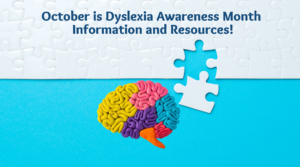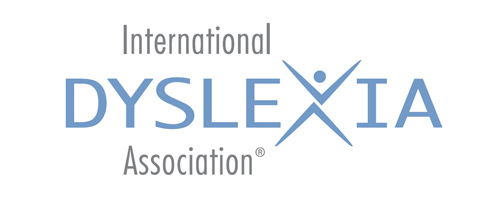
With the 2023 General Assembly, October was declared as Dyslexia Awareness Month permanently.
Follow this link to read the addition to the Virginia Administrative Code
Also, in 2008, Governor Tim Kaine established October in Virginia as Dyslexia Awareness Month.
______________________________________________________________________________
Within the Virginia Administrative Code, dyslexia is defined as:
Dyslexia is distinguished from other learning disabilities due to its weakness occurring at the phonological level. Dyslexia is a specific learning disability that is neurobiological in origin. It is characterized by difficulties with accurate and/or fluent word recognition and by poor spelling and decoding abilities. These difficulties typically result from a deficit in the phonological component of language that is often unexpected in relation to other cognitive abilities and the provision of effective classroom instruction. Secondary consequences may include problems in reading comprehension and reduced reading experience that can impede growth of vocabulary and background knowledge. (This mirrors the 2002 IDA Definition and was adopted in Virginia in 2002 as well.)
(§ 22.1-213 of the Code of Virginia; 34 CFR 300.8(c)(10))
Currently, the International Dyslexia Association (IDA) has focused on efforts on considering a revision to the current definition of dyslexia adopted by the IDA Board in 2002.
Below is the proposed revision:
Dyslexia is a specific learning disability characterized by difficulties in word reading—affecting accuracy, speed, or both—and/or spelling, that can vary depending on the written language system. These difficulties reflect performance at the low end of a continuum of literacy skill and occur despite evidence-aligned instruction that is effective for the individual’s peers. The cause and development of dyslexia involve the interplay of multiple biological and environmental influences. Phonological and/or morphological difficulties are common but not always present. Among the secondary consequences are limitations in language development and academic progress as well as challenges to psychological well-being and vocational opportunities. Although identification and targeted instruction are important at any age, language and literacy support before and during the early years of education can be particularly effective (2025, IDA Proposed Definition).
Additional resources are available from IDA to share the Why and How of their efforts to consider a revision.
________________________________________________________________________________
Resources to learn more about dyslexia:
Virginia Department of Education’s Dyslexia page
Dyslexia Awareness Training Module
Frequently Asked Questions about Dyslexia
Training and Technical Assistance Center at William & Mary – Dyslexia: A Deeper Understanding | Training & Technical Assistance Center | School of Education | W&M School of Education
International Dyslexia Association
Fact Sheets – Fact Sheets – International Dyslexia Association (dyslexiaida.org) and Shop IDA Fact Sheets
____________________________________________________________________________________
Presentations and conferences to support an understanding of dyslexia:
Dyslexia Symposium with the Ruth Harris Professorship at VCU – November 8th, 2025; 8:30am to 2:00pm; Dyslexia Symposium | School of Education | VCU
Empowering Students Who Think and Learn Differently Symposium at The New Community School; October 3rd, 8:30 to 3:30pm.
Virginia Joint Coalition for Learning Disabilities and Literacy (VJCLDL) Session with Tim Odegard on October 10th, 3:30pm to 4:45pm regarding Revisiting the Definition of Dyslexia – (session recording may be found on this webpage)
____________________________________________________________________________________
Resources from resources from other IDA Branches:
Iowa Branch of the International Dyslexia Association (IBIDA) – Dyslexia Awareness Resource Packet
Northern Ohio Branch of the International Dyslexia Association (NOBIDA); Dyslexia Toolkit – Northern Ohio Branch – International Dyslexia Association
____________________________________________________________________________________
Please consider supporting VBIDA’s work through the Dyslexia Awareness Hat Campaign:
VBIDA is raising funds to support our teacher and student scholarships and with this campaign to raise awareness of the celebrations and challenges that individuals with dyslexia face.
Follow this link to more information about the
VBIDA Dyslexia Awareness Hat Campaign!

________________________________________________________________________________
What might you do at home or in your community to learn more about dyslexia:
Decoding Dyslexia Virginia has locally organized learning groups to support parents, educators, and all within an area. Consider joining one of these groups in your area. Follow this link to contact leadership within Virginia to determine if there currently is a group in your area. You may also follow this link to the old website where some groups and contacts are listed.
Journey Into Dyslexia (a video) and The Big Picture: Rethinking Dyslexia (a video) provide a view of the challenges and celebrations of dyslexia. These videos may be purchased from a number of online sources. Consider watching one of these videos to learn more about dyslexia.
Contact the Dyslexia Advisor in your area or division and ask about any events that may be happening to provide information about dyslexia. Contact Mary Murray Stowe at vbidacopres1@gmail.com if you are unclear who the Dyslexia Advisor is in your area or look for this information on your school division’s website.
Organizations that Support Dyslexia Awareness and Appropriate Reading Instruction:
International Dyslexia Association
Virginia Branch of the International Dyslexia Association
Yale Center for Dyslexia and Creativity
Tennessee Center for the Study and Treatment of Dyslexia
National Center for Improving Literacy
Atlantic Seaboard Dyslexia Education Center

